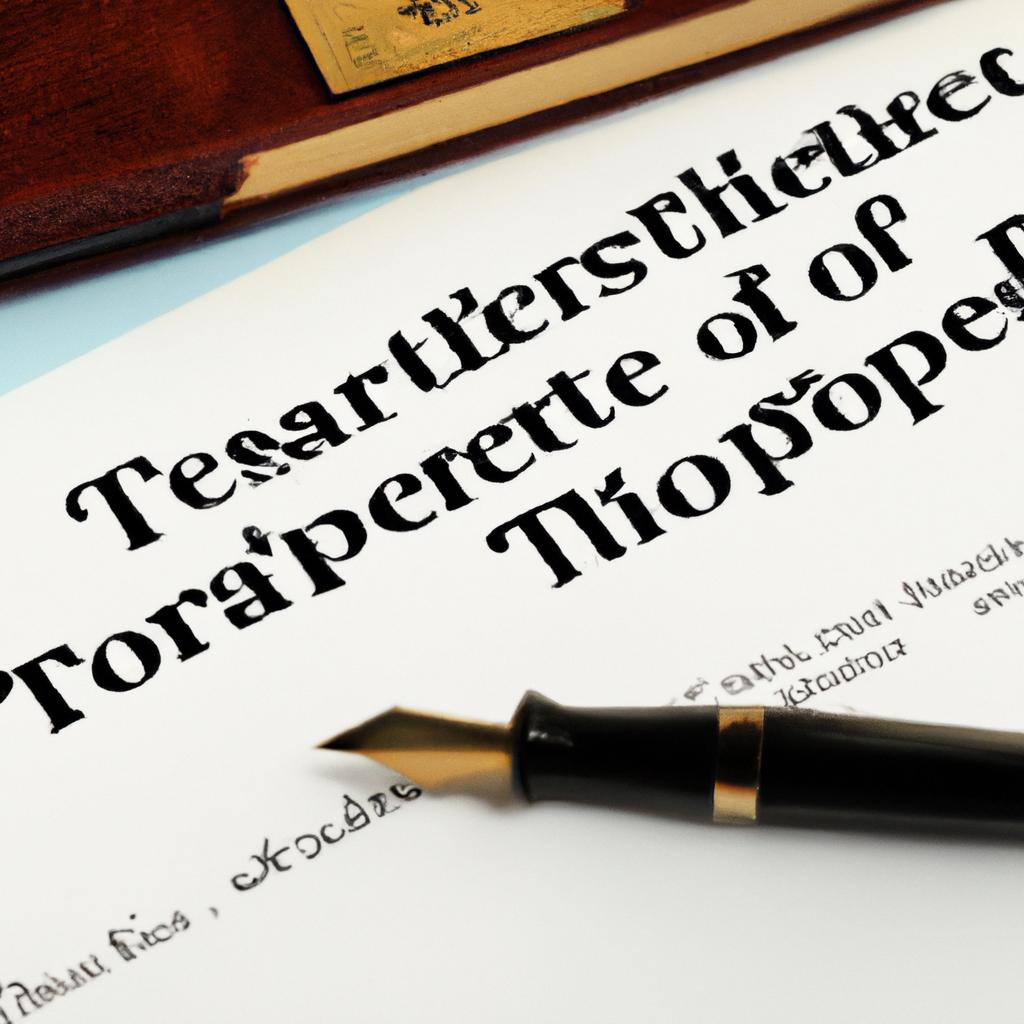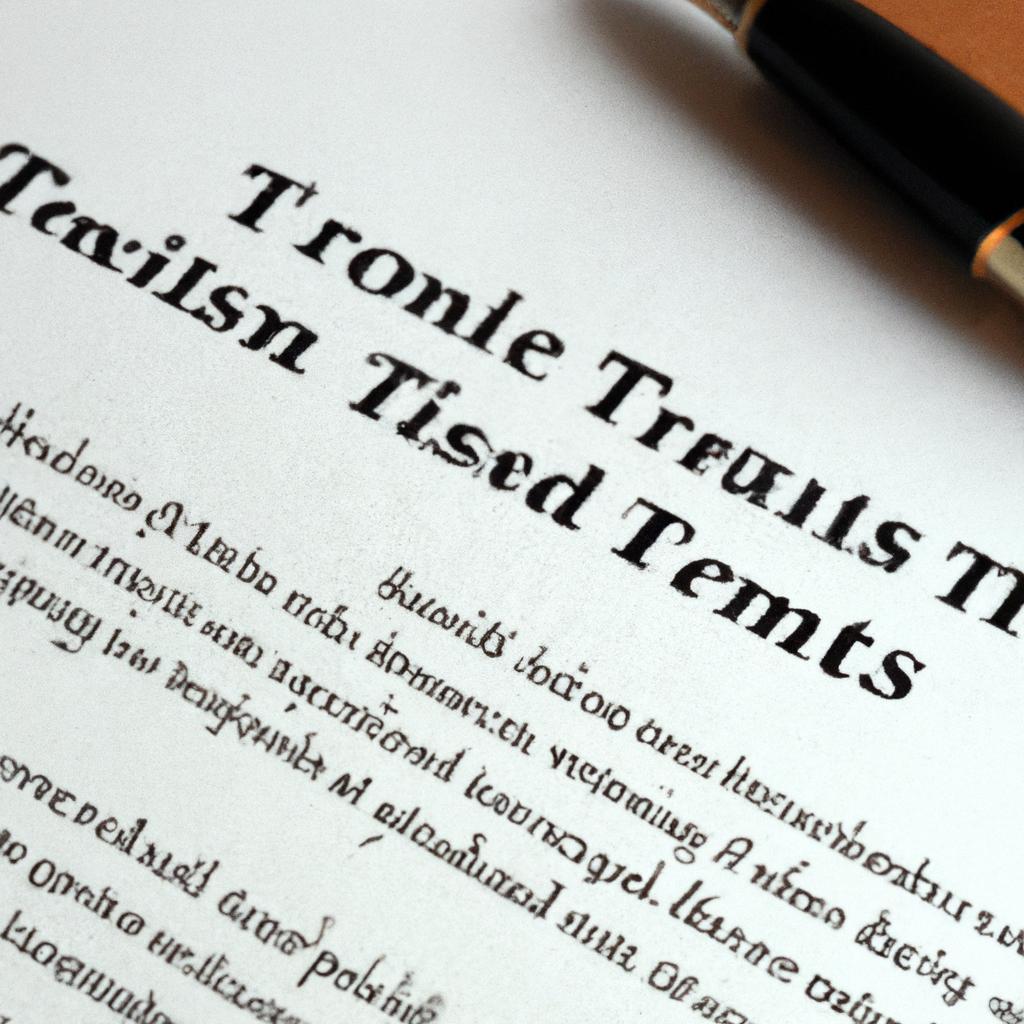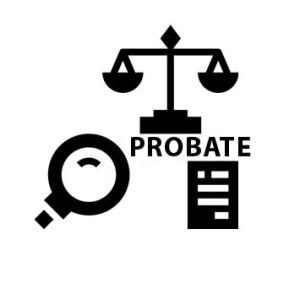In the intricate web of estate planning, the transfer of property after death stands as a pivotal component. As experienced legal counselors at Morgan Legal Group in New York City, we understand the complexities and nuances that accompany posthumous property transfers. From navigating probate proceedings to drafting meticulous Wills and trusts, our team is well-equipped to guide you through the intricate process of ensuring a seamless transfer of assets to your chosen beneficiaries. Join us as we delve into the intricacies of transferring property after death, shedding light on the necessary steps and precautionary measures that must be taken to safeguard your estate for future generations.
Understanding the Probate Process for Transferring Property After Death
When a loved one passes away, the process of transferring their property can be complex and overwhelming for many individuals. Understanding the probate process is crucial to ensuring a smooth transfer of assets to the rightful beneficiaries. Probate is the legal process where a deceased person’s will is validated, and their assets are distributed according to their wishes.
In order to navigate the probate process effectively, it is important to follow these key steps:
- Identify the Executor: The executor is responsible for managing the deceased person’s estate and ensuring that their assets are distributed according to their wishes.
- File the Will: The will must be filed with the probate court, and a petition for probate must be submitted to initiate the probate process.
- Inventory the Assets: The executor must create an inventory of all the deceased person’s assets, including real estate, bank accounts, investments, and personal property.

Utilizing Wills and Trusts to Ensure Smooth Property Transfers
In the realm of estate planning, utilizing wills and trusts is crucial to ensure a smooth transfer of property after death. Wills provide a legal document outlining your wishes for the distribution of your assets upon your passing. Trusts, on the other hand, allow you to transfer ownership of your assets to a trustee who will manage and distribute them according to your instructions. By incorporating both wills and trusts into your estate plan, you can safeguard your assets and ensure they are passed on to your loved ones in an organized and efficient manner.
Wills and trusts offer various benefits when it comes to property transfers after death. They provide a clear outline of your intentions, prevent disputes among beneficiaries, and can help minimize estate taxes. By working with a knowledgeable estate planning attorney, you can create a comprehensive plan tailored to your unique circumstances. At Morgan Legal Group in New York City, our team of experienced professionals specializes in estate planning, probate, elder law, Wills, and trusts. Contact us today to learn more about how we can assist you in securing your legacy and ensuring a seamless transfer of your property.

Navigating Tax Implications When Transferring Property After Death
When navigating the tax implications of transferring property after death, it is important to consider the various factors that can impact the process. One key consideration is the potential inheritance tax that may apply to the transfer of certain assets. In some cases, beneficiaries may be subject to paying taxes on the property they receive, so it is essential to understand the tax laws and exemptions that may apply.
Another important factor to consider when transferring property after death is the capital gains tax that may apply. Depending on the value of the property and how it is transferred, beneficiaries may be subject to paying capital gains tax on any increase in value since the original purchase. It is crucial to work with a knowledgeable estate planning attorney to ensure that all tax implications are considered and that the transfer of property is done in a tax-efficient manner.

Seeking Legal Guidance for Effective Property Transfer Strategies
When it comes to transferring property after death, it is crucial to seek legal guidance to ensure that the process is carried out effectively and efficiently. At Morgan Legal Group, our experienced attorneys specialize in property transfer strategies that adhere to state laws and regulations. By consulting with our team, you can navigate the complexities of transferring property seamlessly.
One effective property transfer strategy is the creation of a trust, which allows you to designate beneficiaries and bypass the probate process. Another option is to establish a joint tenancy with right of survivorship, which enables the property to automatically transfer to the surviving owner upon death. Our attorneys can assist you in determining the best approach based on your individual circumstances and goals. Contact Morgan Legal Group today to learn more about our property transfer services.
Q&A
Q: What is the first step to take when transferring property after someone’s death?
A: The first step is to determine if the deceased left a will. If so, the property will be distributed according to the instructions in the will.
Q: What happens if there is no will?
A: If there is no will, the property will be distributed according to the laws of intestacy in the state where the deceased lived.
Q: What is probate and how does it relate to transferring property?
A: Probate is the legal process of administering the estate of a deceased person. It involves proving the validity of a will and transferring property to beneficiaries.
Q: Can property be transferred without going through probate?
A: Yes, certain types of property, such as assets held in a trust or assets with named beneficiaries, can be transferred without going through probate.
Q: What are some ways to minimize estate taxes when transferring property?
A: One way to minimize estate taxes is to gift assets to loved ones during your lifetime. Another way is to establish a trust to hold and distribute assets after your death.
Q: How does joint tenancy impact the transfer of property after death?
A: In joint tenancy, when one owner dies, their share of the property automatically passes to the surviving owner without going through probate.
Q: What role does an executor play in transferring property after death?
A: An executor is responsible for managing the deceased person’s estate, including transferring property to beneficiaries according to the will or intestacy laws.
Q: How can someone ensure their property is transferred according to their wishes after their death?
A: The best way to ensure your property is transferred according to your wishes is to create a will that clearly outlines how you want your property to be distributed. Additionally, regularly review and update your estate plan as needed.
In Summary
As we close the chapter on how to transfer property after death, it is important to remember that while the legal process may seem daunting, it is ultimately a way to honor the wishes and intentions of the deceased. By understanding the intricacies of estate planning and probate, we can ensure a smooth transition of assets to loved ones and a lasting legacy for generations to come. So, whether you are considering creating a will, establishing a trust, or simply updating your beneficiaries, know that taking the time to plan now can provide peace of mind for your future and the future of those you care about. Remember, the passing of property is not just about material possessions, but about preserving memories, values, and relationships.Thank you for joining us on this journey of understanding how to transfer property after death. Wishing you clarity and peace as you navigate this important aspect of life planning.
 As much as we try to plan for our loved ones’ futures, the inevitable fact is that one day we will pass away. And with that, comes the responsibility of transferring our property and assets to our heirs. This process is known as property transfer after death, and it involves several legal and financial steps that can be overwhelming and confusing for those who are not familiar with it. In this article, we will go through the different options and methods for transferring property after death, along with some useful tips, to make this process as smooth and stress-free as possible.
As much as we try to plan for our loved ones’ futures, the inevitable fact is that one day we will pass away. And with that, comes the responsibility of transferring our property and assets to our heirs. This process is known as property transfer after death, and it involves several legal and financial steps that can be overwhelming and confusing for those who are not familiar with it. In this article, we will go through the different options and methods for transferring property after death, along with some useful tips, to make this process as smooth and stress-free as possible.
Understanding Property Transfer After Death
First and foremost, it is essential to understand what property transfer after death means. In simple terms, it is the legal process of transferring a deceased person’s assets and property to their heirs or beneficiaries. This process is necessary to ensure that the deceased’s wishes for their property are fulfilled and that the transfer is done according to the laws and regulations of the state.
The property that can be transferred after death can include real estate, bank accounts, investments, personal belongings, and any other assets owned by the deceased. Some assets, such as joint bank accounts or properties, may not need to go through the transfer process as they automatically pass to the surviving owner. However, the majority of assets will need to go through the legal process of property transfer after death.
Methods of Property Transfer After Death
There are several ways in which property can be transferred after the owner’s death. The appropriate method will depend on various factors such as the type of property, its value, and the state’s laws and regulations. Let’s go through the most common methods of property transfer after death.
1. Will
One of the most common methods of transferring property after death is through a will. A will is a legal document that outlines the deceased’s wishes for their property. It allows the deceased to specify who will inherit their assets and in what proportion. However, for a will to be valid, it must go through the probate process, which is the court-supervised process of validating and executing a will.
2. Living Trust
A living trust is another option for transferring property after death. It is a legal entity set up by the deceased, in which their assets are transferred to a trustee to manage on behalf of the beneficiaries. Unlike a will, a living trust does not go through the probate process, making the transfer of assets faster and more efficient. However, setting up a living trust can be more costly than a will.
3. Joint Ownership
As mentioned earlier, some assets may automatically pass to the surviving owner. This is known as joint ownership, and it typically applies to properties or bank accounts that are owned jointly by spouses or business partners. In this case, the surviving owner becomes the sole owner of the asset without the need for a transfer process.
4. Beneficiary Designations
Some assets, such as life insurance policies, retirement accounts, and investment accounts, allow the owner to specify a beneficiary to receive the assets upon their death. In this case, the beneficiary simply needs to provide a death certificate to the financial institution holding the asset, and the transfer will be done without the need for probate or a will.
Important Considerations and Tips
Regardless of the method chosen for property transfer after death, there are some essential considerations and tips to keep in mind to ensure a smooth and hassle-free process. These include:
1. Keep Records in Order
It is crucial to keep all financial and legal records organized and up to date. This includes wills, living trusts, deeds, bank statements, and any other documents related to property and assets. This will make it easier for your loved ones to handle the property transfer process and avoid any potential legal issues.
2. Understand State Laws
The transfer of property after death is governed by state laws, and they can vary significantly. It is essential to seek professional legal advice to understand the laws and regulations of your state and ensure that you are following the correct procedures for transferring property.
3. Consult with an Estate Planning Attorney
Estate planning attorneys specialize in the legal aspects of property transfer after death. Seeking their guidance and advice can save you and your loved ones from potential mistakes and complications.
4. Plan Ahead
The best way to make the property transfer process after death easier is to plan ahead and have a well-organized estate plan in place. This will not only make the process smoother but will also give you peace of mind knowing that your wishes will be fulfilled.
In conclusion, transferring property after death can be a complex and overwhelming process, but with proper planning and understanding of the different options available, it can be made much more manageable. It is essential to keep records organized, seek professional legal advice, and plan ahead to ensure that your loved ones inherit your property according to your wishes smoothly and efficiently.





